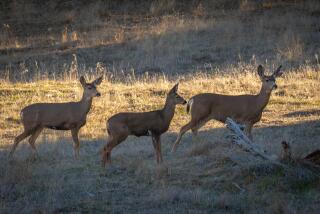Hunter’s Brain-Wasting Disease Wasn’t From Deer, Officials Say
- Share via
MADISON, Wis. — The brain-destroying illness that killed a man who had eaten venison and elk meat was not a form of chronic wasting disease affecting deer herds, state health officials said Thursday.
Wisconsin’s Division of Public Health has been investigating the deaths of three outdoorsmen to find out whether chronic wasting disease crossed from animals to humans, just as “mad cow” disease did in Europe.
The hunters knew one another and ate elk and deer meat at wild game feasts hosted by one of them in Wisconsin during the 1980s and 1990s.
All three died of brain-wasting diseases in the 1990s.
The test results made public Thursday were for Roger Marten, whose death was attributed to Pick’s disease, a more common brain-destroying disorder.
Marten’s brain tissue showed no evidence of the mutant proteins, called prions, that are associated with chronic wasting, state epidemiologist Jim Kazmierczak said.
There has never been a documented case of a person contracting a brain-destroying illness from eating wild animals infected with chronic wasting disease.
The illness is related to mad cow disease in cattle and Creutzfeldt-Jakob disease in humans. All three are caused by prions, which make holes in the brain resembling those in sponges.
Pathologists with the National Prion Disease Surveillance Center also are testing brain tissue from Marten’s acquaintances, James Botts and Wayne Waterhouse.
Botts and Waterhouse died of what was diagnosed as Creutzfeldt-Jakob, their families said.
Creutzfeldt-Jakob is always fatal and occurs in just one in a million people.
Kazmierczak said the state hoped to have test results for them within a few weeks.
In February, chronic wasting disease was found in Wisconsin deer, marking the first time it has showed up east of the Mississippi River.
It was identified in Colorado elk more than three decades ago. Chronic wasting disease now is known to exist in deer or elk in eight states and Canada; thousands of animals are being slaughtered to contain it.
More to Read
Sign up for Essential California
The most important California stories and recommendations in your inbox every morning.
You may occasionally receive promotional content from the Los Angeles Times.













